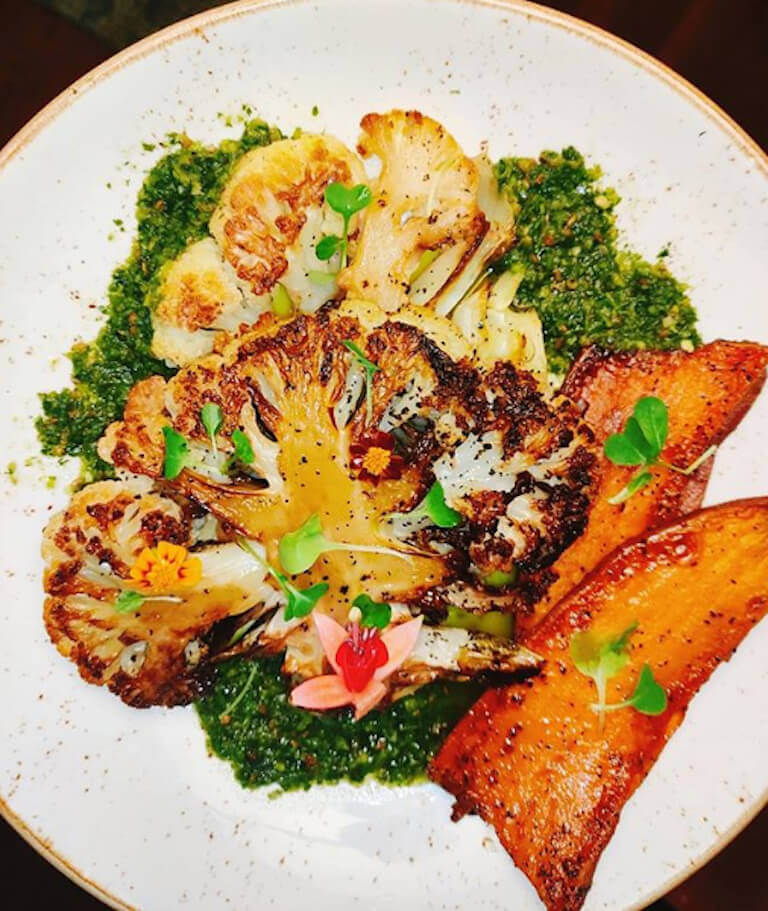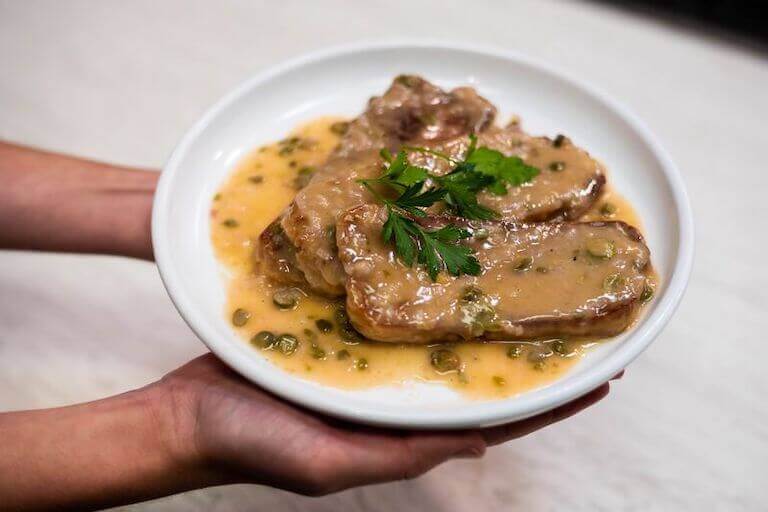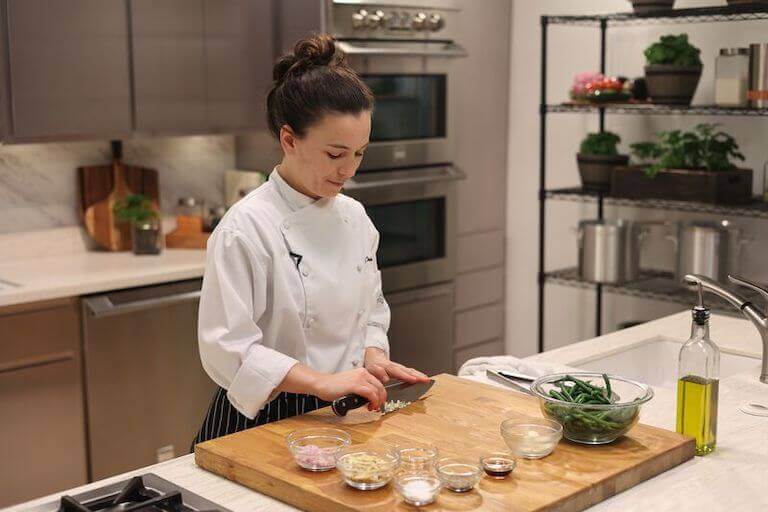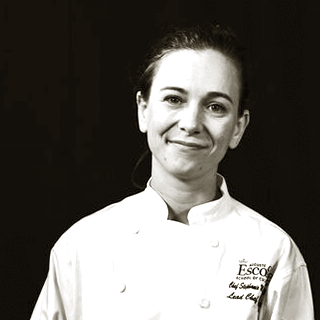Listen to This Article:
Vegans and vegetarians considering a career in the culinary arts have an extra layer of complexity to navigate. Can they attend culinary school while sticking to their vegan and vegetarian principles? Introducing: plant-based culinary school.
Once upon a time, the culinary school options for vegans were limited. But now, there are more options than ever. Find out about being vegan or vegetarian in culinary school, and how to choose the right program for you.
What Vegans and Vegetarians Should Know About Culinary School
Culinary school can provide aspiring chefs with numerous advantages as they work toward building a career in the food industry. Students can develop essential skills to use in the kitchen, from knife techniques to flavor pairings and plating strategies. But their education doesn’t stop there. Courses can also cover topics outside of cooking, such as menu planning, food safety, and kitchen management, which can be invaluable while building a culinary resume.
What Are the Differences Between Vegetarian, Vegan, and Plant-Based?
Vegan culinary school? Vegetarian? Plant-based? Let’s start with some definitions!
Vegetarian: A diet that includes no meat, but may include animal products like milk and eggs
Vegan: A diet that includes no animal products, including meat, eggs, dairy, and honey
Plant-Based: A diet that prioritizes plant-based ingredients like vegetables, grains, and nuts; may or may not include animal products
Culinary school can help inspire students and expand their creativity as they learn about diverse cuisines, ingredients, and techniques. This applies to students going the traditional route as well as those interested in plant-based culinary school options.
What Career Opportunities Exist for Vegan and Vegetarian Chefs?
There are growing opportunities for vegan and vegetarian chefs in the culinary industry. With increased social awareness around vegan activism, the health benefits of plant-based diets, and increasing food allergies, the Vegan Food Global Market Report 2024 expects the vegan food market to experience an 11.4% compound annual growth rate through 2033.
Graduates of a plant-based culinary arts program may find themselves working in the following careers:*
- Executive Chef or Sous Chef at Plant-Based Restaurants: Leading kitchen teams while creating innovative vegan or vegetarian menus.
- Personal Chef: Planning and preparing customized meal plans that align with the dietary preferences of clients.
- Recipe Developer: Creating vegan or vegetarian dishes for food brands, cookbooks, or food blogs.
- Culinary Instructor: Educating others on vegan or vegetarian culinary techniques at cooking schools or community centers.
- Food Product Developer: Working with companies that produce vegan or vegetarian products to help create recipes for items like meat substitutes or vegan cheeses.
- Catering Business Owner: Specializing in vegan or vegetarian events, from corporate gatherings to weddings.
The culinary world is expanding with increasing demand for skilled vegan and vegetarian chefs at restaurants, wellness centers, meal delivery services, and more. You can carve out a niche for yourself in this area by specializing in the unique aspects of vegan and vegetarian cuisine.
The Challenges of Traditional Culinary School for Vegans and Vegetarians
While enrolling in culinary school can be exciting for aspiring chefs, it can include unique challenges for vegans and vegetarians, including:
- Cooking meat-based dishes: Students may be asked to perform tasks such as roasting a chicken, fileting a fish, or learning to butcher meat properly. This can make it difficult for vegan and vegetarian students to balance their personal values with career goals.
- Evaluating Dishes Without Tasting: Assessing non-plant-based dishes can be a unique challenge for vegan and vegetarian culinary students. While they can use sight, smell, and texture to evaluate the quality of a dish, it’s not quite the same as tasting.
- Lack of Understanding Among Peers: Dietary preferences may set vegans and vegetarians apart from other students, leading to feelings of isolation or a lack of understanding from others who might not grasp the ethical or personal motivations behind the decision.
- Lack of a Plant-Based Focus: Traditional curriculums may prioritize animal proteins, leaving vegan and vegetarian students to figure out how to apply techniques to plant-based dishes.
Vegans and vegetarian students may need to get creative while staying true to their personal beliefs in traditional culinary schools. It requires striking a balance between learning valuable skills and maintaining the values that matter to them.
How Can I Succeed in a Mixed Culinary Environment as a Vegan or Vegetarian?
Although there may be challenges when completing culinary school as a vegan or vegetarian in a non-vegan setting, it can be a positive and fulfilling experience.
Before Escoffier had plant-based cooking programs, Shane Witters Hicks, a chef and graduate of Auguste Escoffier School of Culinary Arts, had to weigh his vegetarian lifestyle against what he hoped to learn in school and accomplish after he graduated. He decided that during school, he wanted to taste everything. He felt that was the best way to get the most from his education. Plus, he thought that if he wanted to cook plant-based versions of traditional animal-based foods, he should know what the original tasted like.
“If I opened a vegan barbecue restaurant in the future, I wanted to make sure I had tasted and knew how to make the best regular barbecue,” he said. “I think my plant-based cooking would only benefit from that experience. I wanted to know how the world cooks and eats.”*
With that in mind, Shane decided that the benefits to his future cooking were more important than staying vegetarian during his Culinary Arts program at Escoffier.

Cauliflower “steak” by Chef Shane Witters Hicks
Still, Shane is adamant that he wouldn’t ever tell anyone else how they should cook or eat. “There are plenty of plant-based cooks who stay that way in school,” he said.
The following tips may help vegans and vegetarians as they attend traditional culinary school:
- Practice Open Communication: Sharing your dietary preferences and needs can help foster understanding and respect for your choices.
- Be Open-Minded: Even if you choose not to taste animal-based dishes, be open to learning about various cooking techniques. Observing how others cook can enhance your skills and help you adapt them to plant-based alternatives.
- Practice Alternative Tasting Methods: Use sight, smell, and texture to evaluate dishes. This can be helpful when cooking non-plant based foods without requiring you to taste them. In some ways, honing these alternative senses to assess a dish may be helpful. After all, you can’t taste a restaurant patron’s steak to make sure it’s done correctly!
- Focus on Building Skills: Many of the skills you learn in culinary school, such as knife techniques, sauce-making, and plating are used in plant-based cuisine as well. Concentrate on becoming skilled in these areas.
- Find Like-Minded Peers: Connect with other students in your program or online who are vegan or vegetarian to share experiences, recipes, and support.
These tips can help you stay true to your values while making the most of your culinary education.
Is a Plant-Based Culinary Arts Program the Right Choice?
A plant-based culinary arts program can offer an ideal path for aspiring chefs who want to avoid working with animal products, become vegan chefs, or specialize in plant-based cooking.
Some of the advantages of a plant-based certification for vegans and vegetarians include:
- In-Depth Focus on Plant-Based Ingredients: Students learn to work with a variety of alternative proteins and ingredients, mastering techniques to maximize flavor, texture, and presentation. Topics include dairy alternatives, plant-based meat substitutes, and balancing flavors in vegan dishes, giving graduates a competitive edge in the job market.
- A Comfortable Learning Environment: Plant-based programs eliminate the need to handle animal products, reducing discomfort and allowing students to focus fully on their culinary goals without compromise.
- Community and Support: Vegan and vegetarian students can connect with like-minded peers, creating a support network that enhances learning and fosters long-term professional connections.
For those considering this path, it’s important to choose a program that offers comprehensive training, hands-on experience, and a supportive learning environment.
Escoffier’s Plant-Based Culinary Arts Programs Offer a Compelling Option
Escoffier’s plant-based programs cover the fundamentals of plant-based cooking. Students can discover the basic ingredients and tools they’ll need, explore how to plan a seasonal menu, and dive into plant-based cuisines from around the world.
These programs not only focus on technical cooking skills but also focus on creativity and a deep understanding of flavor development for plant-based dishes. Throughout the program, students may experiment with making dishes such as artfully-composed seasonal salads, cashew-based ice cream, and seitan piccata.

Seitan piccata made in the Plant-Based Culinary Foundations III course
Courses included in the plant-based culinary programs may include the following courses, among others:
- Plant-based culinary foundations
- Menu design
- Foundations of plant-based pastry
- Purchasing and cost control
- Seasonal plant-based cuisine
- Foodservice management
- Plant-based approaches to wellness
- Cultural influences
- Entrepreneurship
The plant-based curriculum can equip students with cooking skills while also providing them with knowledge in areas like menu development, cost control, and management, helping prepare them to succeed as culinary professionals. Each program also includes an in-person externship to help students gain valuable real-world experience in the industry.
At Escoffier, Seasonality and Sustainability Are Fundamental
Many vegans and vegetarians have adopted the lifestyle because of its benefits to the planet. Plant-based foods have a climate impact that’s 10 to 50 times less than that of animal products, but the exact impact of each food depends on how it was produced.1
At Escoffier, Culinary Arts students can dig deeper into food production and its impact on the environment in the Farm to Table® Experience. This course explores seasonality and sustainability in farming and ranching. It also discusses topics like techniques for reducing waste, such as using all parts of an animal. Plant-based cooking classes can help future chefs make smart, environmentally friendly choices in their careers.

Escoffier students and staff exploring a local farm to learn more about sustainable food production practices.
“We do a really good job in our Farm to Table® curriculum where we really try to help the students understand what to do about in-season produce, preserving it, and instilling [sustainability] into their own cooking,” said Dr. Stephanie White, Assistant Professor in Culinary Medicine at the University of Cincinnati, who helped develop Escoffier’s Plant-Based programs and served as Director of Academics.*
*Information may not reflect every student’s experience. Results and outcomes may be based on several factors, such as geographical region or previous experience.
For students at Escoffier’s Austin and Boulder campuses, this course includes hands-on time at a local farm or artisanal food producer. This can help students to connect their work in the kitchen to the source of the ingredients. Online Culinary Arts students can cover similar concepts and may have the chance to attend optional weekend immersions and learn from virtual guest speakers.
The Benefits of Plant-Based Programs for Non-Vegans
Even non-vegetarians may be interested in attending a plant-based program. These days, vegetarianism and veganism aren’t the fringe ideologies they once were. In 2022, 14% of US consumers said they followed a meat-free diet, new meat substitutes are hitting the market seemingly every week, and there are multiple Michelin-starred vegan restaurants.
Modern foodies are excited by the prospect of inventive plant-based dishes, and many consider this niche to be the next frontier of culinary exploration. Vegan or not, culinarians can only benefit from a more thorough understanding of how to make plants taste their best.
Knowing Your Goals Can Help You Choose the Right Program
So which program is right for you?
Some vegan and vegetarian chefs prefer not to consume animal products, but they are willing to cook these ingredients in order to keep their career opportunities open. And a standard culinary arts program can help provide the well-rounded education that makes it possible to pursue the goal of becoming a chef.
On the other hand, if you envision yourself working exclusively in vegetarian restaurants throughout your career, a plant-based culinary program may be the right choice. Or, if you already have the foundations of cooking animal-based proteins, a plant-based program could help you increase your knowledge of working with ingredients like vegetables, nuts, and legumes.

Escoffier students practice essential culinary skills like knife techniques, which are foundational for all types of cuisine.
Regardless of the program, Escoffier can introduce students to both the cooking and business sides of the kitchen. Upon graduation, students may be prepared to jump into their first culinary jobs and start working towards their dreams.
Vegans and Vegetarians Are Welcome
Culinary school is absolutely an option for vegans and vegetarians. Whether you plan to attend a “traditional” culinary arts program or a specialty plant-based program, you can learn a great deal from experienced Chef Instructors and meet like-minded cooks.
Want to compare Escoffier’s Culinary Arts and Plant-Based Culinary Arts programs in more detail? Contact us to learn everything you’ll need to know about these two exciting areas of study.
EXPLORE MORE RESOURCES ON THE VALUE OF A CULINARY EDUCATION WITH THESE ARTICLES:
- What Credentials Do You Need to Become a Plant-Based Chef?
- What Can You Learn in Culinary School?
- How You Can Get Into Culinary School
*Information may not reflect every student’s experience. Results and outcomes may be based on several factors, such as geographical region or previous experience.
This article was originally published on September 1, 2021 and has since been updated.



